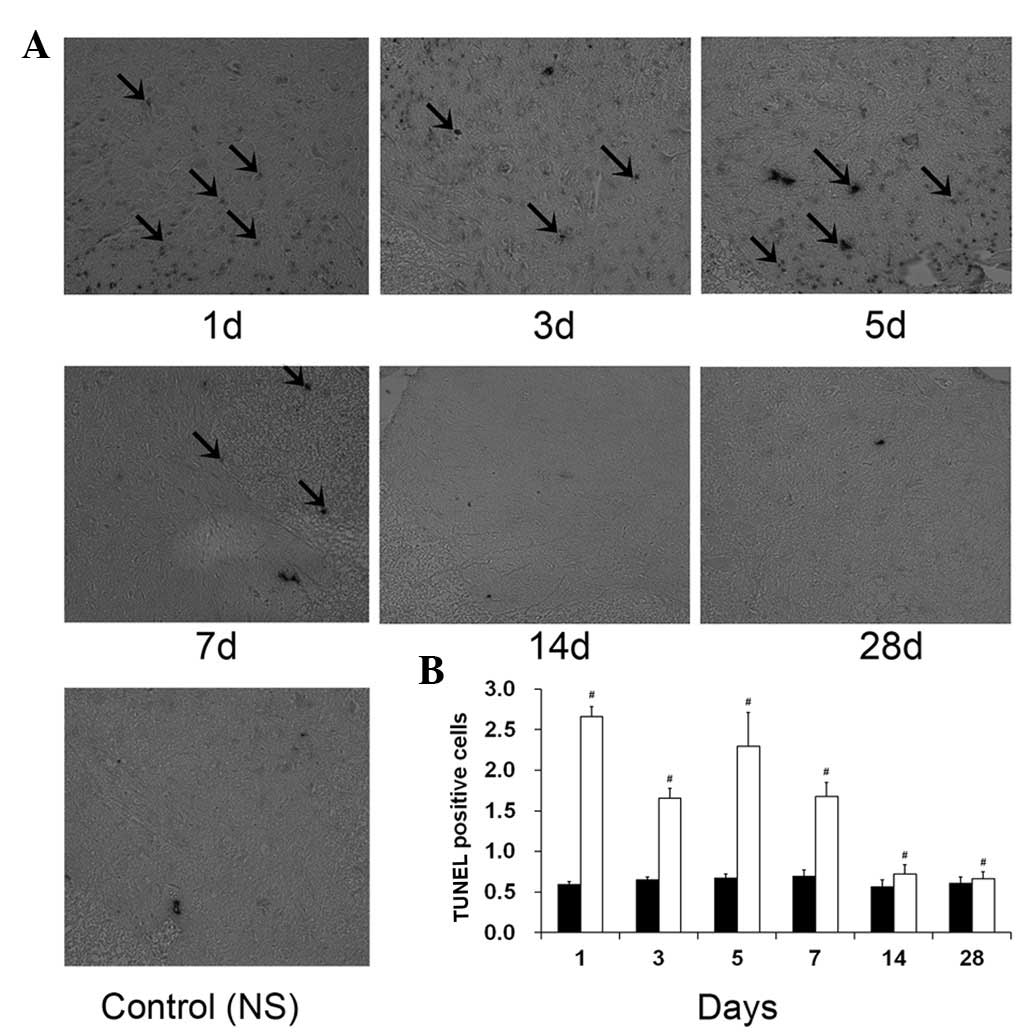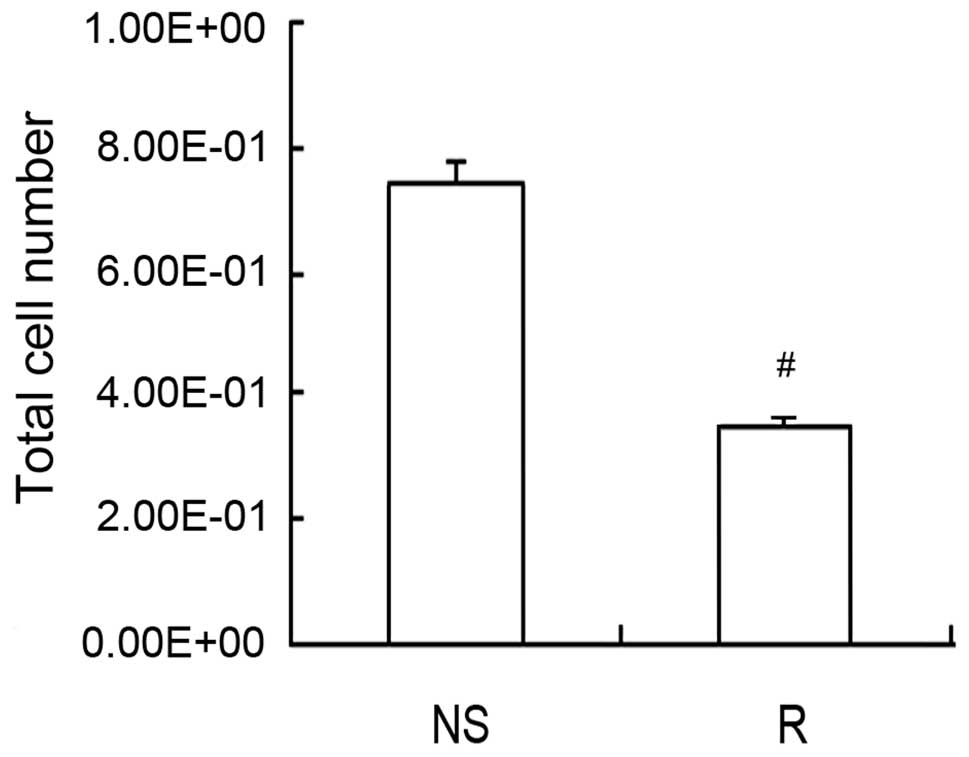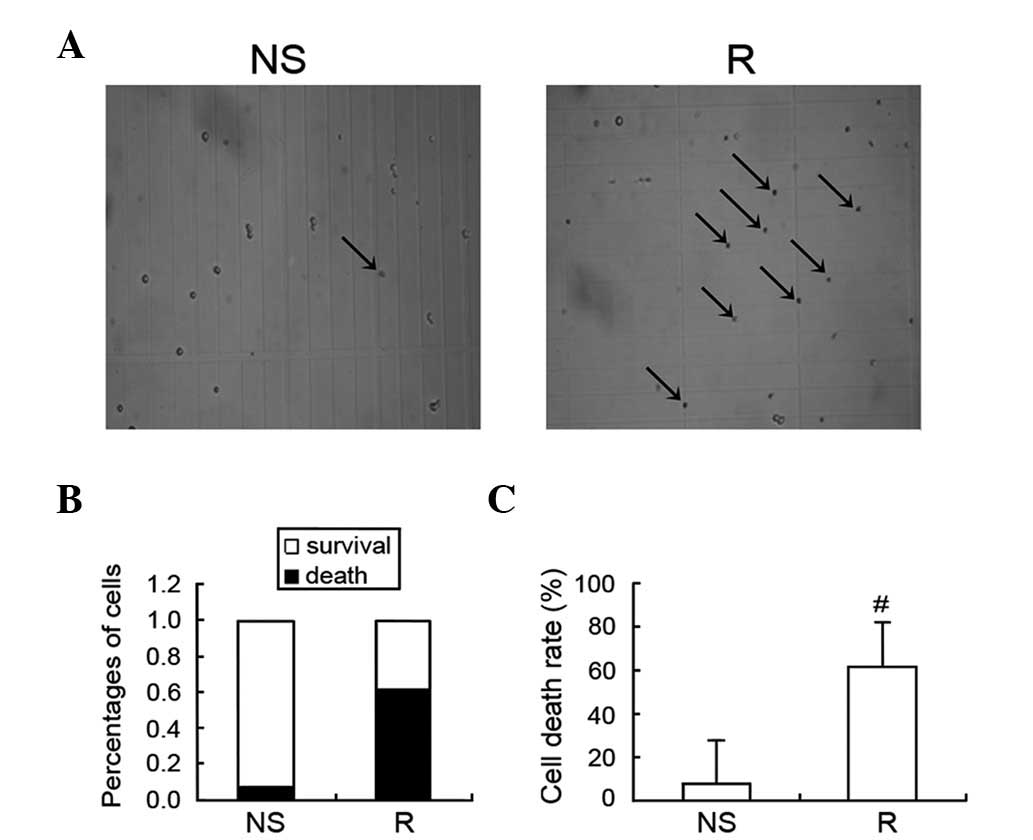|
1
|
Malhotra N, Chanana C, Roy KK, Kumar S,
Rewari V and Sharma JB: To compare the efficacy of two doses of
intraperitoneal bupivacaine for pain relief after operative
laparoscopy in gynecology. Arch Gynecol Obstet. 276:323–326. 2007.
View Article : Google Scholar : PubMed/NCBI
|
|
2
|
Iida H, Watanabe Y, Dohi S and Ishiyama T:
Direct effects of ropivacaine and bupivacaine on spinal pial
vessels in canine. Assessment with closed spinal window technique.
Anesthesiology. 87:75–81. 1997. View Article : Google Scholar : PubMed/NCBI
|
|
3
|
Lee SJ, Shin TJ, Kang IS, Ha JH, Lee SC
and Kim HJ: AMPK attenuates bupivacaine-induced neurotoxicity. J
Dent Res. 89:797–801. 2010. View Article : Google Scholar : PubMed/NCBI
|
|
4
|
Radwan IA, Saito S and Goto F: The
neurotoxicity of local anesthetics on growing neurons: a
comparative study of lidocaine, bupivacaine, mepivacaine, and
ropivacaine. Anesth Analg. 94:319–324. 2002.PubMed/NCBI
|
|
5
|
Maurice JM, Gan Y, Ma FX, Chang YC, Hibner
M and Huang Y: Bupivacaine causes cytotoxicity in mouse C2C12
myoblast cells: involvement of ERK and Akt signaling pathways. Acta
Pharmacol Sin. 31:493–500. 2010. View Article : Google Scholar : PubMed/NCBI
|
|
6
|
Zink W and Graf BM: Local anesthetic
myotoxicity. Reg Anesth Pain Med. 29:333–340. 2004. View Article : Google Scholar
|
|
7
|
Zink W and Graf BM: The toxicity of local
anesthetics: the place of ropivacaine and levobupivacaine. Curr
Opin Anaesthesiol. 21:645–650. 2008. View Article : Google Scholar : PubMed/NCBI
|
|
8
|
Manning BD and Cantley LC: AKT/PKB
signaling: navigating downstream. Cell. 129:1261–1274. 2007.
View Article : Google Scholar : PubMed/NCBI
|
|
9
|
Werdehausen R, Fazeli S, Braun S, et al:
Apoptosis induction by different local anaesthetics in a
neuroblastoma cell line. Br J Anaesth. 103:711–718. 2009.
View Article : Google Scholar : PubMed/NCBI
|
|
10
|
Xu F, Li T and Zhang B: An improved method
for protecting and fixing the lumbar catheters placed in the spinal
subarachnoid space of rats. J Neurosci Methods. 183:114–118. 2009.
View Article : Google Scholar : PubMed/NCBI
|
|
11
|
Zhong Z, Qulian G, Yuan Z, Wangyuan Z and
Zhihua S: Repeated intrathecal administration of ropivacaine causes
neurotoxicity in rats. Anaesth Intensive Care. 37:929–936.
2009.PubMed/NCBI
|
|
12
|
Rose FX, Estebe JP, Ratajczak M, et al:
Epidural, intrathecal pharmacokinetics, and intrathecal
bioavailability of ropivacaine. Anesth Analg. 105:859–867. 2007.
View Article : Google Scholar : PubMed/NCBI
|
|
13
|
Tan Z, Dohi S, Chen J, Banno Y and Nozawa
Y: Involvement of the mitogen-activated protein kinase family in
tetracaine-induced PC12 cell death. Anesthesiology. 96:1191–1201.
2002. View Article : Google Scholar : PubMed/NCBI
|
|
14
|
Lirk P, Haller I, Colvin HP, et al: In
vitro, inhibition of mitogen-activated protein kinase pathways
protects against bupivacaine- and ropivacaine-induced
neurotoxicity. Anesth Analg. 106:1456–1464. 2008. View Article : Google Scholar : PubMed/NCBI
|
|
15
|
Huang Y, Li J, Zhang Y and Wu C: The roles
of integrin-linked kinase in the regulation of myogenic
differentiation. J Cell Biol. 150:861–872. 2000. View Article : Google Scholar : PubMed/NCBI
|
|
16
|
Greene LA and Tischler AS: Establishment
of a noradrenergic clonal line of rat adrenal pheochromocytoma
cells which respond to nerve growth factor. Proc Natl Acad Sci USA.
73:2424–2428. 1976. View Article : Google Scholar
|
|
17
|
Fasolato C, Zottini M, Clementi E,
Zacchetti D, Meldolesi J and Pozzan T: Intracellular
Ca2+ pools in PC12 cells. Three intracellular pools are
distinguished by their turnover and mechanisms of Ca2+
accumulation, storage, and release. J Biol Chem. 266:20159–20167.
1991.
|
|
18
|
Boselli E, Duflo F, Debon R, et al: The
induction of apoptosis by local anesthetics: a comparison between
lidocaine and ropivacaine. Anesth Analg. 96:755–756. 2003.
View Article : Google Scholar : PubMed/NCBI
|
|
19
|
McLure HA and Rubin AP: Review of local
anaesthetic agents. Minerva Anestesiol. 71:59–74. 2005.PubMed/NCBI
|
|
20
|
Wildsmith JA and Selander DE: Measuring
the relative potencies of bupivacaine and ropivacaine in spinal
anesthesia. Reg Anesth Pain Med. 34:73–74; author reply 734–735.
2009. View Article : Google Scholar : PubMed/NCBI
|
|
21
|
Guryay D, Karaege GT, Katircioglu K,
Ozkalkanli MY, Ozgurbuz U and Savaci S: The effects of an epidural
infusion of ropivacaine versus saline on sensory block after spinal
anesthesia. Reg Anesth Pain Med. 33:217–221. 2008. View Article : Google Scholar : PubMed/NCBI
|
|
22
|
Michalek-Sauberer A, Kozek-Langenecker SA,
Heinzl H, Deusch E and Chiari A: Median effective local anesthetic
doses of plain bupivacaine and ropivacaine for spinal anesthesia
administered via a spinal catheter for brachytherapy of the lower
abdomen. Reg Anesth Pain Med. 33:4–9. 2008. View Article : Google Scholar
|
|
23
|
Yuan Y, Guo Q, Ye Z, Pingping X, Wang N
and Song Z: Ischemic postconditioning protects brain from
ischemia/reperfusion injury by attenuating endoplasmic reticulum
stress-induced apoptosis through PI3K-Akt pathway. Brain Res.
1367:85–93. 2011. View Article : Google Scholar
|
|
24
|
Nakajima T, Iwabuchi S, Miyazaki H, et al:
Preconditioning prevents ischemia-induced neuronal death through
persistent Akt activation in the penumbra region of the rat brain.
J Vet Med Sci. 66:521–527. 2004. View Article : Google Scholar : PubMed/NCBI
|
|
25
|
Koike T, Tanaka S, Oda T and Ninomiya T:
Sodium overload through voltage-dependent Na(+) channels induces
necrosis and apoptosis of rat superior cervical ganglion cells in
vitro. Brain Res Bull. 51:345–355. 2000.
|
|
26
|
Mukherjee PK, Marcheselli VL, Serhan CN
and Bazan NG: Neuroprotectin D1: a docosahexaenoic acid-derived
docosatriene protects human retinal pigment epithelial cells from
oxidative stress. Proc Natl Acad Sci USA. 101:8491–8496. 2004.
View Article : Google Scholar
|
|
27
|
Haller I, Hausott B, Tomaselli B, et al:
Neurotoxicity of lidocaine involves specific activation of the p38
mitogen-activated protein kinase, but not extracellular
signal-regulated or c-jun N-terminal kinases, and is mediated by
arachidonic acid metabolites. Anesthesiology. 105:1024–1033. 2006.
View Article : Google Scholar
|
|
28
|
Capdevila X, Pirat P, Bringuier S, et al:
Continuous peripheral nerve blocks in hospital wards after
orthopedic surgery: a multicenter prospective analysis of the
quality of postoperative analgesia and complications in 1,416
patients. Anesthesiology. 103:1035–1045. 2005. View Article : Google Scholar
|
|
29
|
Kitagawa N, Oda M and Totoki T: Possible
mechanism of irreversible nerve injury caused by local anesthetics:
detergent properties of local anesthetics and membrane disruption.
Anesthesiology. 100:962–967. 2004. View Article : Google Scholar
|



















